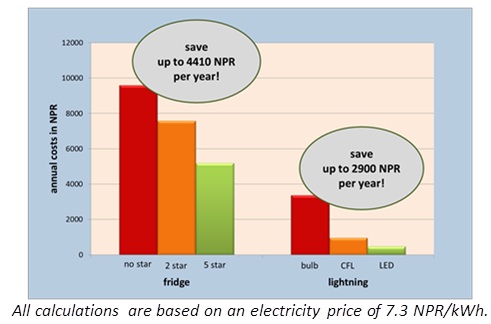

What is it?
Energy Efficiency, is the goal of efforts to reduce the amount of energy required to provide products and services. Reducing energy use is also seen as a key solution to the problem of reducing emissions. Read more scientific definitions on Energy Efficiency.
If energy is used in an efficient way, less energy is wasted during its usage. Nearly every energy transformation process has energy losses, to minimize these losses through better technology and optimal surrending conditions is the main idea of Energy Efficiency. For instance a CFL lamp is up to 4 times more efficient than a regular incandescent lamp. The following example shows the saving potential with energy efficient devices:

According to the International Energy Agency, improved energy efficiency in buildings, industrial processes and transportation could reduce the world's energy needs in 2050 by one third, and help control global emissions of greenhouse gases.
Background
In many developing countries and emerging economies increasing prosperity and growing population are causing the demand for energy to rise sharply. This results in bottlenecks in the energy supply, an increasing financial burden on the state, the economy and private households, and a growing burden on the environment through the increased use of fossil resources. For these reasons, decoupling economic development from energy consumption is an important goal of sustainable energy management. Energy efficiency is an essential element of sustainable energy management, if energy consumption is to be reduced.
The global potential for reducing energy consumption is enormous: It amounts to about 30 percent in OECD countries and as much as 30 to 50 percent in developing and transition countries. To achieve energy efficiency, the necessary conditions must be actively put in place by policy makers. Efficiency must, however, be implemented wherever energy is 'consumed': In power generation and distribution, in buildings, industry, private households, community facilities and transportation.

Energy Efficiency can be applied in various fields both on individual and on national scale and level. Energy efficient production in the industrial sector reduced the pressure of energy demand on the domestic energy supply market. A focus on efficient ways to use various sources of energy ranging from biomass, over petrol to hydropower, must be promoted and maintained on all levels of policy making and household decisions. If fuels are used in an efficient way pollution is reduced, which is benefical for health and the environment. So energy efficiency applies to every one, as every one can benefit from it.
Why should I do it?
There are many different benefits for everyone who uses energy in an efficient way:
- Money saving
- Less load shedding
- A healthier environment to live in
What can I do?
Every household uses energy in some way or another. If it is heat energy for daily cooking use or electric energy in order to switch on your lights and TV after work. Whatever source of energy you use, you can save energy by using more efficient devices like Improved Cooking Stoves (ICS), energy labelled household appliances and energy saving light bulbs. The movie Let's Save Energy shows many things you can do, to be more energy efficient.
You Tube Movie: Energy, let's save it!
Source: EuTube; official channel of the European Commission
Downloads:
- Further information on the definiton of Energy Efficiency (2008) - English
- RETScreen International - Training and Information Materials regarding Energy Efficiency (2012) - English
Links:
| What is |
| Energy Efficiency? |
| Energy Efficiency, is the goal of efforts to reduce the amount of energy required to provide products and services. |
| (In short terms: Do more with less) |
| +Read more |
| Energy Management | |
|
The judicious and effective use of energy to maximize profits (minimize costs) and enhance competitive positions |
| Energy Conservation | |
|
The result of several processes or developments, such as productivity improvement, technological progress, better operation and maintenance practices etc. |
| Energy Efficiency | |
|
Energy Efficiency is achieved at device or equipment level when energy intensity in a specific product, process or area of production or consumption is reduced without affecting output, consumption or comfort levels |


